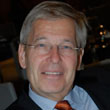news
Prof. Klaus-Dirk Henke
School of Economics and Management, Institute for Economy and Economic Law, Technical University Berlin (Germany)
October 2013
Make health part of economic policy
Health care is commonly considered an overhead and a drain on a nation’s finances. On the contrary, “health is a major production factor” contributing to growth, innovation and exports, says Klaus-Dirk Henke.
In short, health is a major driver of economic growth. As Henke notes, a healthy population is more productive. Given this, boosting human capital - as mediated through healthcare - should be a central plank of economic policy. Investing in health and education increases the innovation skills and knowledge base of the population, in turn promoting growth in other sectors while at the same time reinforcing health as an economic catalyst.
“Even in austerity, health is, together with education, a major factor that influences the sustainability of a country positively,” Henke says.
One illustration of the contribution of healthcare to economic stability comes from a recent analysis Henke carried out on Germany’s seven leading pharmaceutical and medical device companies. These are responsible for creating highly skilled jobs, investing large amounts of money in research and development and being major exporters.
These seven companies account for nearly 35 per cent of the total gross value-added in Germany’s pharmaceutical and medical technology sectors. The amount of value-added increased by nearly 40 per cent between 2005 – 2010, growing at a rate that was nearly three times higher than other sectors as a whole, and more than the value-added by Germany’s world-leading automotive industry.
Pharmaceuticals and medical technology in general outperformed other leading German industries, including mechanical engineering and the electronics sectors. Germany’s industrial healthcare sector employs an above-average number of highly educated staff and is also important in creating jobs in its supply chain.
Economic dividends go hand-in-hand with health dividends
The title of Henke’s presentation to the Lithuanian Presidency conference is ‘The Economic and Health Dividend of Health care and health’. One of the best illustrations of these dividends comes from investing in health prevention, a move that simultaneously prevents the onset of disease but also reduces health care costs whilst at the same time creating the potential for people to continue working beyond the retirement age of 65.
Whilst only 3 per cent of health care budgets are currently devoted to prevention of any kind, the desire to reduce the incidence of non-communicable diseases requires that the prevention and control of their risk factors is given the same level of attention as the prevention and control of infectious diseases.
A new understanding of health care
In most countries, health policy is straitjacketed by a focus on cost containment. A “new understanding of health care” is needed to enable a move to what Henke terms, “an open health society”.
From this fresh perspective, rather than being viewed as a cost, health care is seen as a growing sector that increases the workforce and creates new career opportunities. Rather than focussing on the resources that health care consumes, the emphasis is on investment in health to promote growth and productivity.
The focus on healthcare’s volume of inputs is replaced by a determination of its quality and outputs – assessing how to ‘buy’ the most health. And health is no longer the sole preserve of the health care system, but is integrated into other aspects of life. This focus will attract investors, creating new markets for a healthy, though ageing, population and driving demand in fitness, mobile health, assisted living technologies and nutrition.
Viewed from this new perspective –health spending as an investment - it becomes essential to factor health into other aspects of government policy. It also requires the development of improved indicators so the contribution of health care to the national economy in terms of value added, employment, and economic growth, can be tracked.
“We are now doing research on the health dividend/effects of potential investments. We do not know how the value added to the health economy should be measured, (on a micro, regional/sectoral or macro level) in terms of productivity and efficiency,” Henke concluded.

